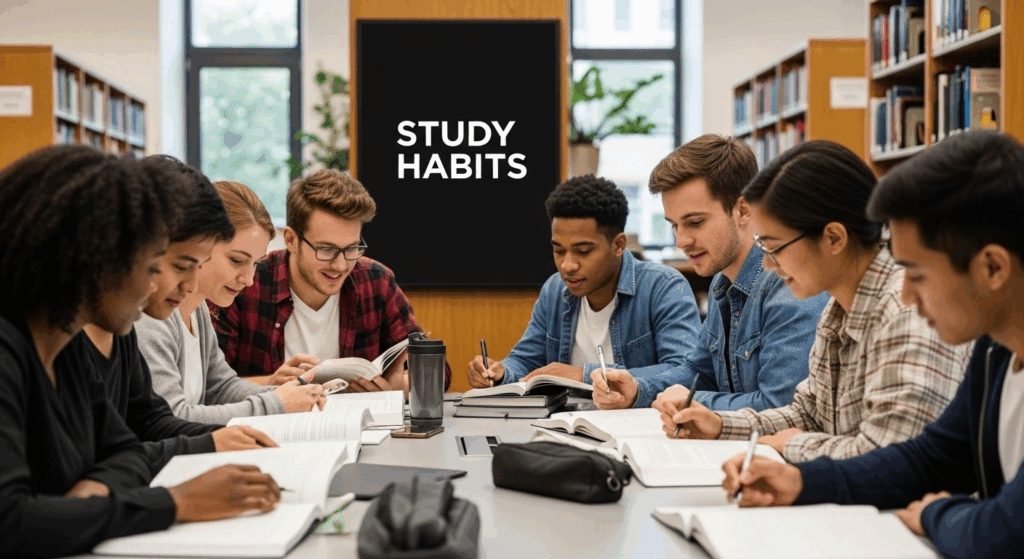
Mastering schoolwork often feels like a guessing game. You might think long hours and all-nighters will guarantee top scores and better memory. Yet, research proves otherwise. Students who stick to consistent study routines actually enjoy higher grades and even better well-being than those who cram at the last minute. And get this. Small tweaks in your daily habits can totally flip your academic results. What seems like a minor change in your routine could become the turning point between struggle and genuine academic success.
Table of Contents
- Why Study Habits Matter For Students
- Essential Study Habits For Better Learning
- How To Build And Keep Good Study Habits
- Common Mistakes And How To Avoid Them
Quick Summary
| Takeaway | Explanation |
|---|---|
| Effective study habits boost academic performance | Consistent study routines enhance discipline, time management, and overall learning retention, leading to better grades. |
| Organize study materials for efficiency | Strategic organization of notes and resources aids retention and reduces time wasted searching for information. |
| Create distraction-free study environments | Establishing focused, personalized study spaces improves concentration and aids memory retention by fostering better learning conditions. |
| Utilize active learning strategies | Engaging directly with the material through summarization and teaching enhances understanding and recall beyond rote memorization. |
| Combat procrastination with structured schedules | Setting specific, attainable study goals and breaking tasks into smaller parts helps curb procrastination and improves focus. |
Why Study Habits Matter for Students
Study habits are the foundation of academic success, transforming how students approach learning and achieve their educational goals. Understanding the critical role these habits play can make the difference between merely attending classes and truly excelling in academic pursuits.
The Academic Impact of Strategic Study Behaviors
Research provides compelling evidence about the profound connection between study habits and academic performance. A comprehensive study published in Advances in Medical Education and Practice revealed a positive and significant correlation between students’ study habits and their overall academic achievement. This means that the way students organize, approach, and engage with their learning can dramatically influence their grades and long-term educational outcomes.
Consistent study habits help students develop crucial skills beyond mere academic knowledge. They cultivate discipline, time management, and self-motivation – qualities that are essential not just in educational settings but throughout professional careers. By establishing structured learning routines, students learn to process information more efficiently, retain knowledge more effectively, and approach complex academic challenges with confidence.
Behavioral Patterns and Academic Success
Research analyzing behavioral patterns of undergraduate students demonstrated that regularity in daily routines, termed ‘orderness,’ is strongly correlated with higher academic performance. Students who maintain consistent study schedules and create systematic approaches to learning tend to outperform their peers who study sporadically or without clear strategies.
These behavioral patterns extend beyond simple time management. They involve creating environments conducive to learning, developing personalized study techniques that match individual learning styles, and maintaining mental and physical wellness that supports cognitive functions. Effective study habits are not about studying longer but studying smarter.
Personal Factors and Academic Achievement
A study in BMC Medical Education highlighted that personal factors significantly impact academic achievement. This research underscores that study habits are deeply personal and interconnected with individual motivation, self-discipline, and psychological readiness to learn.
Students who understand their unique learning preferences can develop tailored study strategies that maximize their potential. This might involve identifying optimal study times, creating distraction-free environments, using specific memorization techniques, or leveraging technology for more interactive learning experiences.
By recognizing the multifaceted nature of study habits, students can transform their academic journey from a passive experience to an active, engaging process of continuous growth and learning. The key lies not in adopting a one-size-fits-all approach but in understanding and developing study habits that resonate with individual learning styles, strengths, and goals.
Essential Study Habits for Better Learning
Developing effective study habits is more than just spending hours with textbooks. It involves creating strategic approaches that optimize learning, enhance retention, and promote long-term academic success. Understanding and implementing these essential study habits can transform how students engage with educational material.
Strategic Study Material Organization
According to Loma Linda University’s School of Medicine, organizing study materials is a critical first step in developing productive learning strategies. Color-coding notes, creating systematic filing systems, and maintaining clean, structured study resources can significantly improve information processing and recall.
Effective organization goes beyond physical materials. Digital organization is equally important in today’s technology-driven educational landscape. Students should develop digital filing systems, use cloud storage for easy access, and create structured digital notes that can be quickly reviewed and referenced. This approach helps minimize time spent searching for information and maximizes study efficiency.

Creating Optimal Learning Environments
Insights from the Queensland Brain Institute emphasize the importance of creating purposeful study environments. This involves eliminating distractions, establishing dedicated study spaces, and understanding individual learning preferences. Some students might prefer quiet library corners, while others might find background music or coffee shop ambiance more conducive to concentration.
Varying study locations can also enhance learning. Studying in different environments helps the brain create multiple neural connections, making information retrieval more flexible. This technique, known as context-dependent learning, suggests that changing study spaces can improve memory retention and prevent mental fatigue associated with monotonous study routines.
Cognitive Learning Strategies
Psych Central highlights the significance of adopting effective cognitive learning strategies that go beyond traditional rote memorization. These include techniques like active recall, where students test themselves on material, rewriting notes to reinforce understanding, and using mnemonic devices to make complex information more memorable.
Additionally, students should focus on understanding core concepts rather than superficial memorization. This means asking critical questions, seeking connections between different topics, and engaging actively with study materials. Breaking complex information into smaller, manageable chunks and using visual aids like mind maps can make learning more interactive and comprehensible.
Practicing mindfulness and managing stress are also crucial components of effective study habits. Regular breaks, proper sleep, balanced nutrition, and occasional meditation can significantly improve cognitive function and learning capacity. Students who integrate these holistic approaches tend to show better academic performance and reduced study-related anxiety.
Ultimately, developing essential study habits is a personalized journey. What works perfectly for one student might not be as effective for another. The key is to experiment, reflect, and continually refine study strategies to match individual learning styles, academic goals, and personal strengths.
Here’s a summary table of essential study habits mentioned in this section, including their benefits and related strategies. This makes it easy to scan and remember the core practices for better learning.
| Habit/Strategy | Key Benefit | Example Actions |
|---|---|---|
| Organize Study Materials | Efficient info retrieval, improved recall | Color-code notes, digital filing, keep clean workspace |
| Create Optimal Environments | Better focus and memory retention | Study in quiet/dedicated spaces, minimize distractions |
| Use Active Learning Techniques | Deeper understanding, easier recall | Active recall, teach others, use mnemonics |
| Vary Study Locations | Enhanced memory via multiple neural connections | Switch study spots, avoid routine-related fatigue |
| Manage Stress & Wellness | Improved cognitive function, reduced anxiety | Take breaks, sleep well, eat balanced meals |
How to Build and Keep Good Study Habits
Building and maintaining effective study habits requires intentional effort, strategic planning, and consistent commitment. Unlike temporary academic strategies, sustainable study habits transform learning from a sporadic activity into a structured, productive process that supports long-term academic success.
Creating a Structured Study Framework
According to Bowdoin College, developing a structured study routine is fundamental to academic achievement. This involves planning specific times for studying, setting clear goals for each session, and prioritizing challenging assignments. Students should approach study time as a deliberate, scheduled commitment rather than an optional activity.
Establishing a consistent study schedule requires understanding personal energy patterns and productivity cycles. Some students are morning learners, while others perform best in evening hours. By identifying individual peak performance times, students can optimize their study sessions for maximum effectiveness and engagement. This personalized approach ensures that study time aligns with natural cognitive rhythms.
Personal Accountability and Resource Management
Kansas State University emphasizes the importance of taking personal responsibility for learning. This means making intentional decisions about priorities, time allocation, and learning resources. Students must proactively design their study environment, select appropriate learning tools, and maintain discipline in their academic pursuits.
Accountability involves creating systems of self-tracking and progress monitoring. This could include using digital planners, maintaining study journals, or setting up reward mechanisms for achieving study goals. By establishing clear metrics and regularly reviewing academic progress, students can stay motivated and adjust their strategies as needed.
Developing Sustainable Study Habits
Sustainable study habits are built through consistent practice and gradual skill development. Students should start by implementing small, manageable changes to their study routines. This might involve dedicating 30 minutes daily to focused study, gradually increasing duration and complexity as habits become more ingrained.
Technology can be a powerful ally in developing study habits. Digital tools like productivity apps, online calendars, and study tracking software can help students maintain consistency and provide visual representations of their progress. However, it is crucial to use these tools as supportive mechanisms rather than becoming overly dependent on them.
Mindset plays a critical role in habit formation. Students should view study habits as skills to be developed, not inherent talents. This growth-oriented perspective encourages resilience, allowing individuals to learn from setbacks and continuously refine their approach. Embracing a learning mindset means understanding that effective study habits are cultivated through patience, practice, and persistent self-improvement.
Building good study habits is not about perfection but about progress. Each small step towards more structured, intentional learning contributes to long-term academic success. By combining strategic planning, personal accountability, and a growth-oriented mindset, students can transform their approach to learning and unlock their full academic potential.
Common Mistakes and How to Avoid Them
Study habits are complex, and students often encounter pitfalls that can significantly hinder their academic progress. Understanding these common mistakes and developing strategies to overcome them is crucial for maintaining effective learning approaches.
Procrastination and Time Management Challenges
Lesley University highlights procrastination as a critical study trap that undermines academic performance. Procrastination creates a cycle of stress, rushed learning, and incomplete understanding of course materials. Students frequently delay studying by engaging in distracting activities, believing they work best under pressure.
To combat procrastination, students should implement strategic time management techniques. This includes breaking larger tasks into smaller, manageable chunks, using time-blocking strategies, and creating realistic study schedules. Setting specific, achievable goals for each study session helps maintain focus and reduces the overwhelming feeling that often triggers procrastination.
Ineffective Learning Strategies
According to the Corporate Finance Institute, inconsistent study patterns and poor learning techniques are significant barriers to academic success. Passive reading, rote memorization, and cramming are among the most counterproductive study methods students commonly employ.
Active learning strategies provide a more effective alternative. This involves engaging deeply with course material through techniques like summarizing information in personal words, teaching concepts to others, creating visual mind maps, and applying theoretical knowledge to practical scenarios. Students should focus on understanding core concepts rather than merely memorizing facts.
To help illustrate the differences between effective and ineffective study habits as discussed in the article, the following table compares these two approaches side by side.
| Study Approach | Effective Habits | Ineffective Habits |
|---|---|---|
| Organization of Materials | Color-coding, digital filing, structured notes | Disorganized, hard-to-find notes or materials |
| Study Schedule | Consistent, scheduled study times | Cramming or sporadic, last-minute sessions |
| Learning Strategies | Active recall, summarizing, teaching others | Passive reading, rote memorization, cramming |
| Study Environment | Distraction-free, tailored spaces, variable locations | Noisy, distracting, or unprepared environments |
| Technology Usage | Uses productivity apps purposefully, limits distractions | Constant digital interruptions, notifications, multitasking |
| Accountability | Self-tracking, study journals, reward systems | No progress monitoring, lack of self-discipline |
| Mindset | Growth mindset, resilience, continual self-improvement | Fixed mindset, avoidance of feedback or new approaches |
Technology and Cognitive Distractions
Study skills research from Wikipedia emphasizes the significant impact of technological distractions on learning effectiveness. Smartphones, social media, and constant digital notifications fragment attention and reduce cognitive capacity for deep learning.
Minimizing technological interruptions requires intentional strategies. Students can implement techniques like turning off notifications during study sessions, using website blockers, and creating dedicated distraction-free study environments. Establishing clear boundaries between study time and digital entertainment helps maintain focus and improves information retention.
Additionally, students should be aware of their personal energy cycles and cognitive limitations. Studying during peak mental alertness, taking regular breaks, and maintaining a balanced lifestyle with adequate sleep and nutrition can significantly enhance learning capabilities.
Recognizing and addressing these common study mistakes is not about achieving perfection but developing a more mindful, strategic approach to learning. By understanding personal learning patterns, implementing effective strategies, and maintaining a growth mindset, students can transform potential obstacles into opportunities for academic growth and improved educational outcomes.
Frequently Asked Questions
What are effective study habits for students?
Effective study habits for students include organizing study materials, creating optimal learning environments, using active learning techniques, maintaining consistent study schedules, and managing stress through regular breaks and a balanced lifestyle.
How can I improve my study organization?
To improve study organization, you can color-code your notes, create systematic filing systems, use digital organization tools, and maintain a clean study space to enhance information processing and retrieval.
What strategies can help combat procrastination while studying?
To combat procrastination, break larger tasks into smaller, manageable chunks, use time-blocking techniques, set specific and achievable study goals for each session, and establish a structured study schedule to maintain focus.
How can I minimize distractions while studying?
Minimize distractions by creating a dedicated study environment, silencing notifications on your devices, using website blockers, and selecting quiet or conducive spaces for studying to enhance concentration and retention.
Transform Your Study Habits and Stay Ahead with Ultra News
Struggling to build effective study routines or feel overwhelmed by distractions? You are not alone. Many students want to improve learning outcomes and manage time better, but creating sustainable study habits can seem impossible. The article highlighted the importance of structured study plans, active learning strategies, and focused environments for academic success. However, finding trustworthy guidance and timely tips is often a challenge.

Take the next step toward academic excellence. Explore even more expert advice, research-backed resources, and practical study hacks at Ultra News. Our Education section is designed to keep you informed with the latest educational trends and actionable tips that help you excel. Visit Ultra News now and transform how you approach learning—your future self will thank you.




